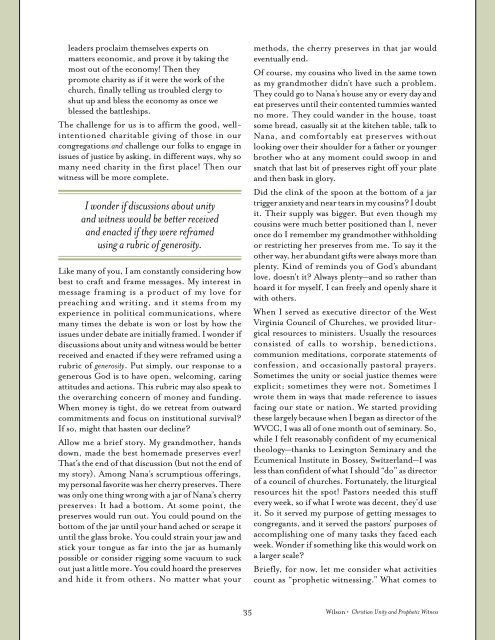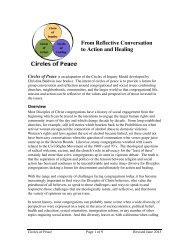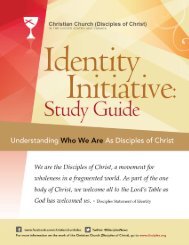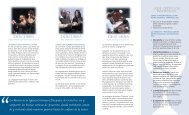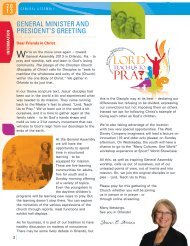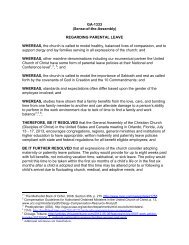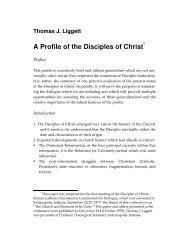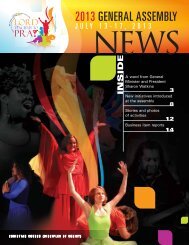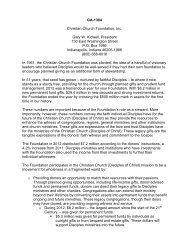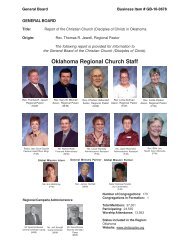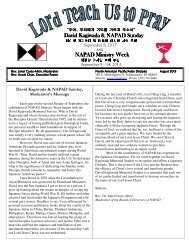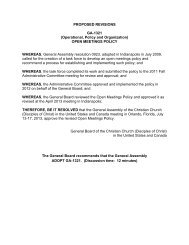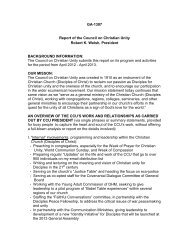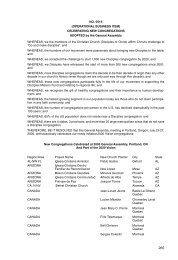RESOURCING THE CHURCH FOR ECUMENICAL MINISTRy A ...
RESOURCING THE CHURCH FOR ECUMENICAL MINISTRy A ...
RESOURCING THE CHURCH FOR ECUMENICAL MINISTRy A ...
Create successful ePaper yourself
Turn your PDF publications into a flip-book with our unique Google optimized e-Paper software.
leaders proclaim themselves experts on<br />
matters economic, and prove it by taking the<br />
most out of the economy! Then they<br />
promote charity as if it were the work of the<br />
church, finally telling us troubled clergy to<br />
shut up and bless the economy as once we<br />
blessed the battleships.<br />
The challenge for us is to affirm the good, wellintentioned<br />
charitable giving of those in our<br />
congregations and challenge our folks to engage in<br />
issues of justice by asking, in different ways, why so<br />
many need charity in the first place! Then our<br />
witness will be more complete.<br />
I wonder if discussions about unity<br />
and witness would be better received<br />
and enacted if they were reframed<br />
using a rubric of generosity.<br />
Like many of you, I am constantly considering how<br />
best to craft and frame messages. My interest in<br />
message framing is a product of my love for<br />
preaching and writing, and it stems from my<br />
experience in political communications, where<br />
many times the debate is won or lost by how the<br />
issues under debate are initially framed. I wonder if<br />
discussions about unity and witness would be better<br />
received and enacted if they were reframed using a<br />
rubric of generosity. Put simply, our response to a<br />
generous God is to have open, welcoming, caring<br />
attitudes and actions. This rubric may also speak to<br />
the overarching concern of money and funding.<br />
When money is tight, do we retreat from outward<br />
commitments and focus on institutional survival?<br />
If so, might that hasten our decline?<br />
Allow me a brief story. My grandmother, hands<br />
down, made the best homemade preserves ever!<br />
That’s the end of that discussion (but not the end of<br />
my story). Among Nana’s scrumptious offerings,<br />
my personal favorite was her cherry preserves. There<br />
was only one thing wrong with a jar of Nana’s cherry<br />
preserves: It had a bottom. At some point, the<br />
preserves would run out. You could pound on the<br />
bottom of the jar until your hand ached or scrape it<br />
until the glass broke. You could strain your jaw and<br />
stick your tongue as far into the jar as humanly<br />
possible or consider rigging some vacuum to suck<br />
out just a little more. You could hoard the preserves<br />
and hide it from others. No matter what your<br />
35<br />
methods, the cherry preserves in that jar would<br />
eventually end.<br />
Of course, my cousins who lived in the same town<br />
as my grandmother didn’t have such a problem.<br />
They could go to Nana’s house any or every day and<br />
eat preserves until their contented tummies wanted<br />
no more. They could wander in the house, toast<br />
some bread, casually sit at the kitchen table, talk to<br />
Nana, and comfortably eat preserves without<br />
looking over their shoulder for a father or younger<br />
brother who at any moment could swoop in and<br />
snatch that last bit of preserves right off your plate<br />
and then bask in glory.<br />
Did the clink of the spoon at the bottom of a jar<br />
trigger anxiety and near tears in my cousins? I doubt<br />
it. Their supply was bigger. But even though my<br />
cousins were much better positioned than I, never<br />
once do I remember my grandmother withholding<br />
or restricting her preserves from me. To say it the<br />
other way, her abundant gifts were always more than<br />
plenty. Kind of reminds you of God’s abundant<br />
love, doesn’t it? Always plenty—and so rather than<br />
hoard it for myself, I can freely and openly share it<br />
with others.<br />
When I served as executive director of the West<br />
Virginia Council of Churches, we provided liturgical<br />
resources to ministers. Usually the resources<br />
consisted of calls to worship, benedictions,<br />
communion meditations, corporate statements of<br />
confession, and occasionally pastoral prayers.<br />
Sometimes the unity or social justice themes were<br />
explicit; sometimes they were not. Sometimes I<br />
wrote them in ways that made reference to issues<br />
facing our state or nation. We started providing<br />
these largely because when I began as director of the<br />
WVCC, I was all of one month out of seminary. So,<br />
while I felt reasonably confident of my ecumenical<br />
theology—thanks to Lexington Seminary and the<br />
Ecumenical Institute in Bossey, Switzerland—I was<br />
less than confident of what I should “do” as director<br />
of a council of churches. Fortunately, the liturgical<br />
resources hit the spot! Pastors needed this stuff<br />
every week, so if what I wrote was decent, they’d use<br />
it. So it served my purpose of getting messages to<br />
congregants, and it served the pastors’ purposes of<br />
accomplishing one of many tasks they faced each<br />
week. Wonder if something like this would work on<br />
a larger scale?<br />
Briefly, for now, let me consider what activities<br />
count as “prophetic witnessing.” What comes to<br />
Wilson • Christian Unity and Prophetic Witness


